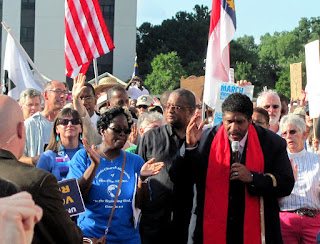As we've witnessed our national dialogue boil over into "us versus them" or "red versus blue" or "urban versus rural" or the even more egregious "you're either with us or you're against us", it is important to remember there is an inherent value in advocacy partnerships. It is even more important for the HIV advocacy community to continue to leverage broad partnerships, rather than retreat into corners. Adopting the latter approach would surely result in less potent national and state-level advocacy, fewer programmatic outcomes, and far less access to care and treatment for the patients who need it.
The ADAP Advocacy Association has long boasted in its tag line that it "works with advocates, community, health care, government, patients, pharmaceutical companies and other stakeholders." Yet, all too often, some question why one group or another is invited to sit our communal table. Unfortunately, it is happening more so in recent years. It is a troubling trend, no doubt.
Our organization's primary audience is the patient. One of our core value statements is that the voice of individuals living with HIV/AIDS shall always be at the table and the center of the discussion. All too often the patient voice is pushed aside, or not even included in important conversations because they're characterized as "bitching and moaning" rather than proposing solutions. But haven't patients earned that right, because after all they're the ones living with the damn disease? That said, such an narrow attitude under-estimates the valuable contributions made by patients every single day!
Likewise, state health department employees aren't the enemy. They are our partners and if state agencies are doing something counterintuitive to promoting greater access to care and treatment, then it is the advocacy community's and patient community's role to engage them. Joey Wynn, who serves as a board member to this organization, routinely engages state agencies in Florida...including when those same agencies are doing something the local advocacy community finds potentially harmful. Joey's approach has served people living with HIV/AIDS in South Florida rather well, too. In fact, I've personally witnessed the effectiveness behind his approach at a town hall meeting in Miami (as seen above when Joey invited me to speak), as well as his past leadership with the Florida HIV/AIDS Advocacy Network ("FHAAN").
Beating up on pharmaceutical companies is easy, and it most certainly is a popular thing to do. Yet, it is indeed possible to push back on the high cost of prescription drug prices while simultaneously working with these same partners to fight harmful public policy proposals, such as federal budget cuts, or the dangerous idea of drug importation.
 |
| Photo Source: Wikipedia |
Nashville, Tennessee-based advocate and social media guru Josh Robbins is prime example! Josh has partnered with numerous private entities — such as medical diagnostic companies and pharmaceutical companies — and various public agencies — including health departments — to promote a litany of public health initiatives ranging from National HIV Testing Day, U=U, and access to PrEP. His groundbreaking work in Tennessee could not have been achieved operating from a silo.
Wanda Brendle-Moss, who also serves as a board member to this organization, recently reflected on her HIV advocacy journey. Wanda has demonstrated that collaboration is an effective advocacy tool in North Carolina, evidenced by her relationships with the North Carolina AIDS Action Network, North Carolina Harm Reduction Coalition ("NCHRC"), and the Rev. William Barber II's Moral Mondays (as seen in the photo above). Wanda would work with anyone who will answer her phone call, email, or text!
Speaking of North Carolina and NCHRC, under the leadership of the former executive director, Robert Childs, progressive harm reduction policies were adopted in a conservative state with an even more conservative General Assembly. Such legislative victories in the state included achieving syringe exchange programs, expanded Naloxone access, Good Samaritan protections, prescription drug monitoring programs, among other things. How? It was the advocacy partnerships developed by NCHRC, including with some VERY unlikely allies.
Nationally, efforts such as the ongoing U=U campaign ("Undetectable = Untransmittable") to reduce HIV-related stigma could not have happened without Bruce Richman's steady leadership. It isn't surprising that Bruce has assembled an extremely broad coalition of community partners, representing all stakeholder groups.
The most effective advocacy is rooted in advocacy partnerships, and not rivalries. With the current occupant residing at 1600 Pennsylvania Avenue being so unfriendly to our community, such advocacy partnerships are even more important now!


No comments:
Post a Comment